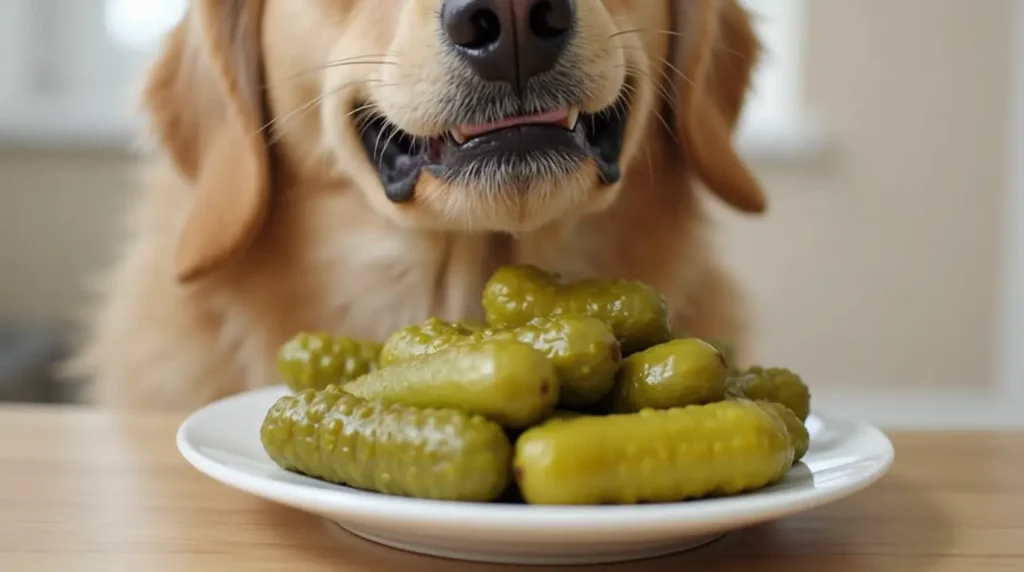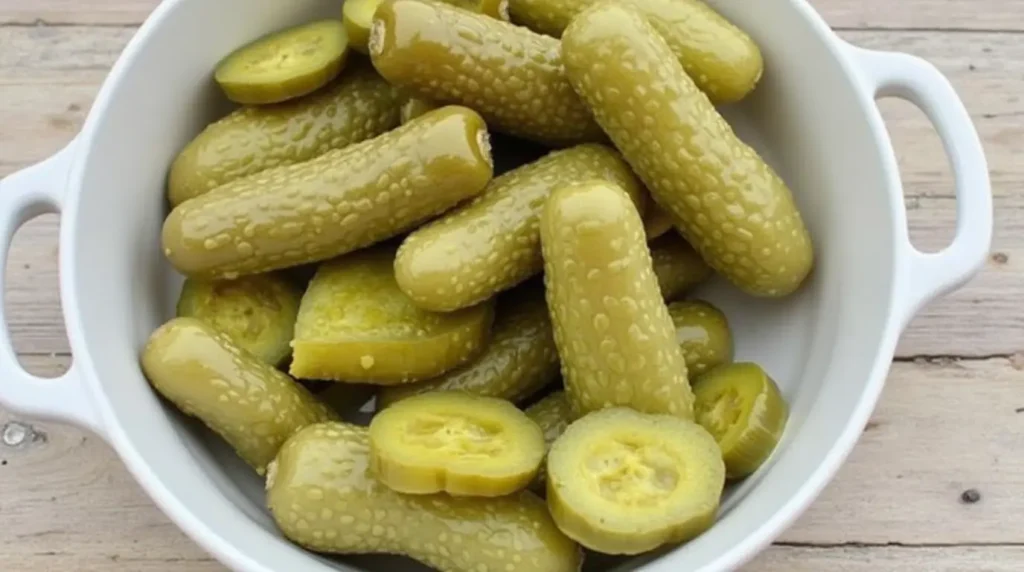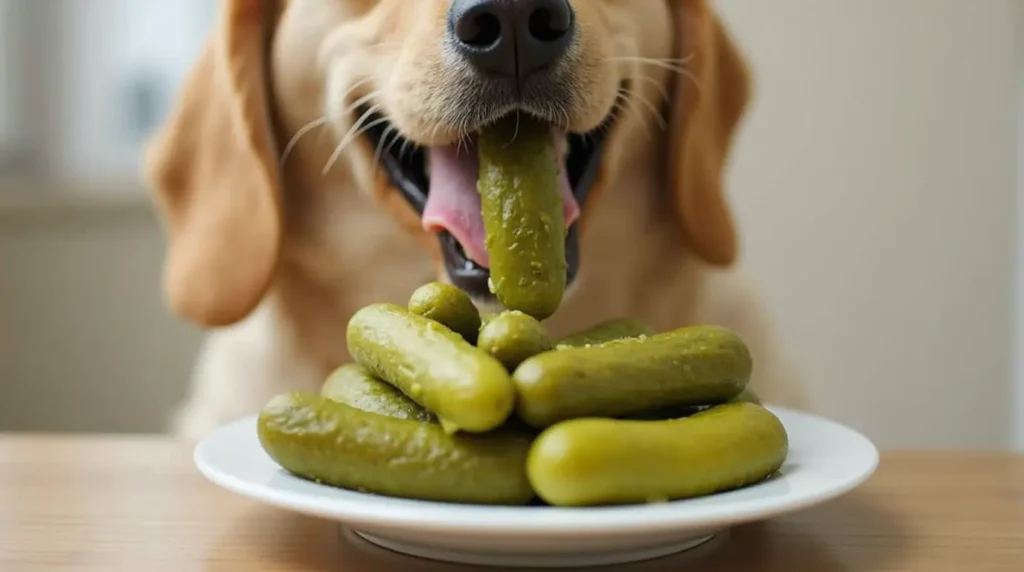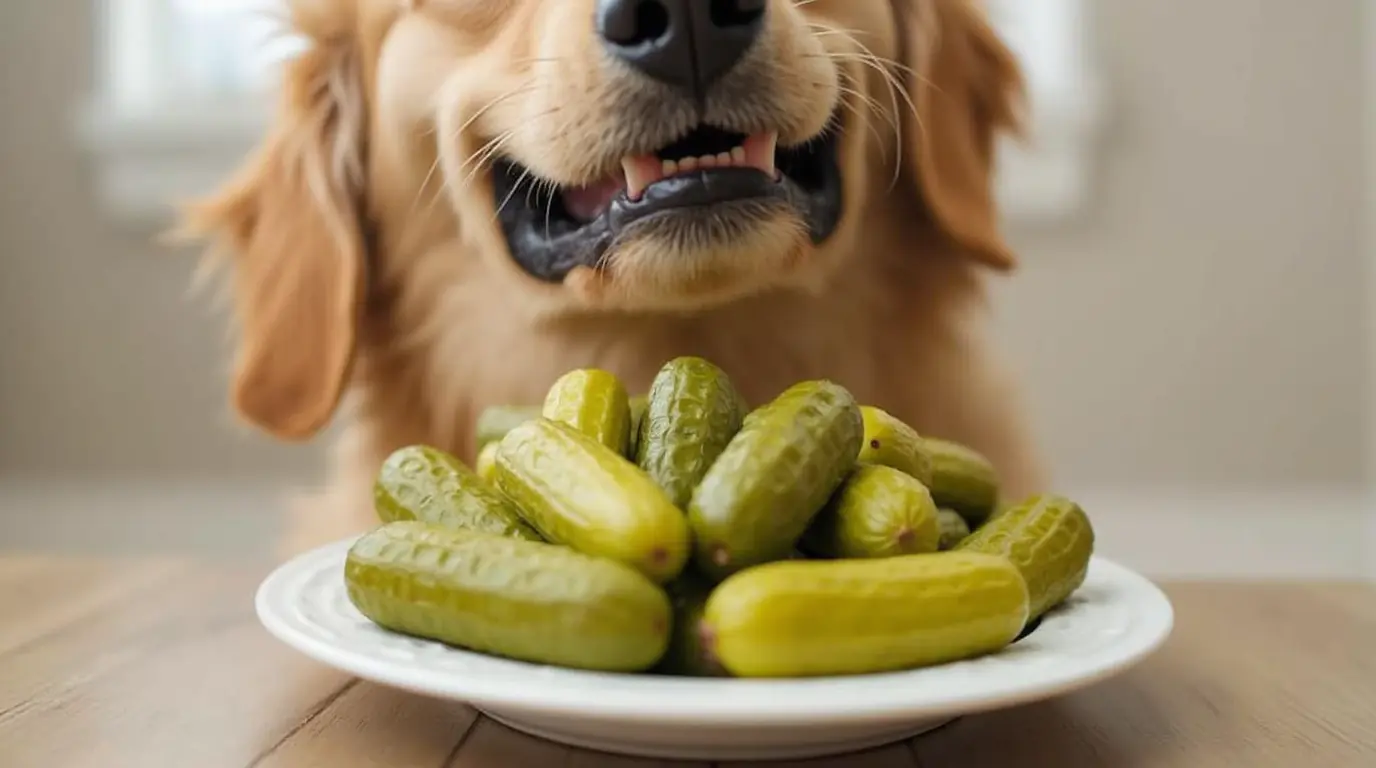If you’re a dog owner who enjoys a tasty pickle now and then, you might have wondered, “Can dogs eat pickles?” It seems like a harmless question, but there’s much more to the answer than you might think. Pickles are a popular snack for humans, but are they safe for dogs? While they might not seem dangerous at first glance, they come with potential risks that dog owners should understand.
In this comprehensive guide, we’ll uncover the truth about feeding pickles to your dog. We’ll dive into the risks, benefits, and everything else you need to know before offering your dog a bite of your pickle. Whether you’re a first-time dog owner or someone just curious, this article will provide the essential knowledge you need to ensure your pet’s health and safety.
What Are Pickles Made Of? Should They Be Given to Dogs?

Before we answer the question, “Can dogs eat pickles?” let’s break down what exactly pickles are made of. Pickles are cucumbers that have been soaked in a brine or vinegar solution, which typically contains salt, vinegar, and sometimes sugar, garlic, onion, and other spices.
Main Ingredients of Pickles:
- Cucumbers (the base of the pickle)
- Brine or Vinegar Solution (salt and vinegar)
- Spices (garlic, onion, mustard, pepper, etc.)
While pickles are safe for humans, the ingredients can pose risks to dogs. Let’s explore what happens when dogs eat pickles.
The Risks of Feeding Pickles to Your Dog
Pickles are not inherently toxic to dogs, but they can present significant risks, especially if consumed in large quantities. These risks stem mainly from the high sodium content, the vinegar used in pickling, and the spices that are often added to the pickles.
| Ingredient | Potential Risks |
|---|---|
| Salt (Sodium) | Can lead to salt poisoning, dehydration, and kidney problems if consumed in large amounts. |
| Vinegar | May cause stomach upset, bloating, and gas. |
| Garlic & Onion | Both are toxic to dogs and can cause anemia or damage to red blood cells. |
- Salt: The primary concern with pickles is their salt content. Too much salt can cause salt poisoning, which is extremely dangerous and can lead to symptoms like vomiting, diarrhea, excessive thirst, and even kidney failure.
- Vinegar: Vinegar is not inherently dangerous but can upset a dog’s digestive system, leading to symptoms like stomach pain, gas, or even vomiting.
- Garlic & Onion: Garlic and onion are highly toxic to dogs, even in small amounts. They can damage your dog’s red blood cells and lead to anemia, which could result in fatigue, weakness, or more severe health issues.
How Much Pickle Can a Dog Safely Eat?

If you’re determined to give your dog a small taste of pickles, it’s essential to understand how much is safe. The key is moderation.
The recommended safe amount is a tiny slice of pickle (less than 1 cm in size), and it should be unsalted and free of any harmful spices like garlic or onion.
Guidelines for Serving Pickles to Dogs:
- Always serve small slices to avoid choking.
- Ensure the pickle is free from garlic and onion.
- Limit the frequency—pickles should not be a regular snack for your dog, but rather an occasional treat.
Can Pickles Be Beneficial for Dogs?

Surprisingly, there are some potential benefits to feeding your dog pickles in small amounts, but these are limited. Here’s what you need to know about the possible positive aspects of pickles for dogs:
| Benefit | Explanation |
|---|---|
| Hydration | Cucumbers, the base of pickles, have a high water content (about 95%), which can help keep your dog hydrated. |
| Probiotics | Some naturally fermented pickles contain beneficial bacteria that support digestion and gut health. |
Note: While these benefits sound appealing, they don’t outweigh the risks, and pickles should never be relied upon as a primary source of nutrition for your dog.
How to Safely Serve Pickles to Your Dog
If you still want to treat your dog to a pickle, it’s important to follow certain precautions to ensure its safety. Here’s how you can serve pickles safely:
- Choose simple pickles: Opt for pickles that are low in salt and free from garlic or onion. Look for organic or homemade versions if possible.
- Cut pickles into small pieces: This minimizes the risk of choking and makes it easier for your dog to digest.
- Rinse the pickle: If you’re unsure about the salt content, rinse the pickle to remove excess sodium.
- Limit servings: Keep it as an occasional treat, and avoid making it a regular part of your dog’s diet.
What Are the Best Alternatives to Pickles for Dogs?

If you want to avoid the risks associated with feeding pickles to your dog, there are plenty of healthier alternatives. Here are some options that are both safe and healthy:
| Healthy Alternative | Benefits |
|---|---|
| Carrots | Great for teeth cleaning and high in Vitamin A, which supports healthy vision. |
| Apples | Rich in fiber and Vitamin C, apples help with digestion and provide antioxidants. |
| Cherries | Packed with antioxidants, cherries can boost your dog’s immune system and help with inflammation. |
| Blueberries | Low in calories, high in vitamins, and a powerful source of antioxidants. |
| Sweet Potatoes | A great source of fiber and beta-carotene, which promotes healthy skin and digestion. |
These alternatives provide much more nutritional value and are safer for dogs, making them a much better choice than pickles.
What to Do If Your Dog Eats Too Many Pickles?
If you suspect your dog has eaten too many pickles, especially if they’ve consumed a large quantity of pickles with harmful ingredients, it’s important to monitor for signs of distress. Here’s what you can do:
- Watch for symptoms: If your dog begins showing signs of excessive thirst, vomiting, or diarrhea, they may have ingested too much salt or vinegar.
- Contact your vet: If symptoms persist or if you’re concerned about salt poisoning or garlic toxicity, consult your veterinarian immediately.
- Provide water: If your dog has ingested too much salt, ensure they have access to plenty of fresh water to help flush out the toxins.
Long-Term Health Effects of Feeding Pickles to Dogs
If pickles are given regularly, they could have lasting effects on your dog’s health. The long-term risks of feeding pickles include:
- Salt poisoning: Chronic exposure to high amounts of salt can lead to kidney damage and other severe health issues.
- Stomach problems: The vinegar in pickles can cause gas, bloating, and upset stomachs, especially in sensitive dogs.
For your dog’s well-being, it’s best to limit pickles and instead provide them with nutritious, dog-safe treats.
Is it okay for dogs to eat pickles?
Pickles aren’t toxic to dogs, so if your dog happens to eat one that accidentally fell on the floor, there’s no need to worry. Pickles contain many of the same vitamins and minerals found in cucumbers, along with additional digestive benefits from the probiotics produced during the fermentation process.
Will pickles help a dog’s upset stomach?
While dill, as a seasoning, may have soothing effects on an upset stomach, giving your dog dill pickles to relieve discomfort might not be a good idea. The high sodium and vinegar content in pickles can actually irritate your dog’s stomach and make things worse.
Pickles are high in sodium
Yes, pickles are extremely high in sodium because salt is a crucial part of the brining process. Too much salt in a dog’s diet can lead to health issues like high blood pressure. Just as with humans, if someone is trying to reduce their sodium intake or is on blood pressure medication, they should limit pickle consumption or opt for low-sodium varieties.
Are Pickles Safe for My Dog?
Pickles can pose risks to dogs, especially because of the spices and the high sodium content. For dogs with pre-existing health conditions, consuming too much sodium can lead to serious complications. Dr. Fox explains that a large intake of sodium over a short period can trigger side effects such as seizures, excessive thirst, vomiting, diarrhea, or loss of balance (ataxia).
Sodium is essential in a dog’s diet in small amounts, but too much can be harmful. The Association of American Feed Control Officials (AAFCO) recommends that commercial dry dog food should contain at least 0.3% sodium to support a dog’s normal body function and growth. When sodium levels drop too low, it can become dangerous, impacting both physical and mental health.
Conclusion: Can Dogs Eat Pickles Safely? The Final Verdict
So, can dogs eat pickles safely? The answer is a qualified yes. While pickles are not inherently toxic to dogs, they come with significant health risks, especially due to their high salt content and potentially toxic ingredients like garlic and onion.
If you choose to give your dog pickles, do so sparingly, and ensure that the pickle is unsalted and free from harmful spices. Remember that healthier alternatives like carrots, apples, and blueberries are always a safer choice.
Call to Action:
Have you ever given your dog a pickle? Share your experience and let us know how your dog reacted! Subscribe to our newsletter for more pet care tips and advice on keeping your furry friend happy and healthy.
FAQs About Dogs and Pickles
- Can pickles cause diarrhea in dogs?
Yes, due to the high vinegar and salt content, pickles can upset your dog’s stomach and cause diarrhea. - Are spicy pickles safe for dogs?
No, spicy pickles contain toxic spices like garlic and onion, which are harmful to dogs. - Can dogs eat dill pickles?
Dill pickles are fine in small quantities, as long as they don’t contain garlic or onion. - Can dogs drink pickle juice?
No, pickle juice is high in sodium and should be avoided. - Can pickles affect dogs’ kidneys?
Yes, excessive salt in pickles can lead to kidney damage over time. - Can puppies eat pickles?
No, puppies should avoid pickles due to their delicate digestive systems. - What are better alternatives to pickles for dogs?
Carrots, apples, and blueberries are healthier, safer alternatives for your dog.

